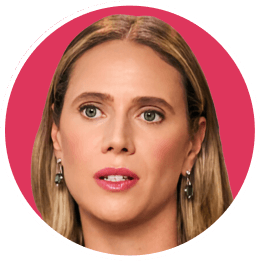

Join a top women’s health expert & neuroscientist Dr. Emily Jacobs for a discussion around the connection between hormones, cognition, brain health and beyond. If you’ve ever struggled with word finding, concentration, focus and general sharpness in menopause, this talk is for you. We’ll cover:
➡️ Is it Brain Fog, or is it Dementia?
➡️ How Hormones Impact Cognitive Function (ADHD, focus, and more): hint: we need more research!
➡️ Staying Sharp While Navigating Menopause at Work
➡️ Strengthening Brain Health in Menopause, including menopause hormone therapy (MHT) and alternative non-hormonal options
Note: If you’re unable to attend live, we will share a video replay of the talk with anyone who has RSVP’d.

Emily Jacobs is Director of the Ann S. Bowers Women’s Brain Health Initiative and Associate Professor of Psychological and Brain Science at UC Santa Barbara. Prior to UCSB, she held a faculty appointment at Harvard Medical School and the Department of Medicine/Division of Women's Health at Brigham & Women's Hospital. She is a graduate of Smith College and earned her Ph.D. in Neuroscience at UC Berkeley. Her body of work is transforming our understanding of the human brain as an endocrine organ that pulses in time with the rhythmic ebb and flow of gonadal hormones. Her lab pioneered the use of precision imaging methods to generate the first detailed map of the human brain across pregnancy and she directs a multi-center study of the neurological changes that occur across the menopausal transition. Dr. Jacobs' serves on the Steering Committee of the Women’s Brain Health Coalition, 51 Foundation, and the WHAM Research Collaborative to drive the national and international agenda on women’s health research. Over the past year, she joined President Biden and Dr. Jill Biden at the launch of the White House Initiative of Women's Health Research. In recognition of her work, Emily was named a National Academy of Sciences Frontiers of Science Fellow for distinguished scientists under 45 and one of Science News’ “10 Scientists to Watch”. Her work is featured in The New York Times, National Geographic, Scientific American, NPR, BBC, TED, Netflix, and MasterClass. In addition to research, her lab regularly partners with K-12 groups to advance girls' representation in STEM.
Let's Talk Menopause is a nonprofit organization. When you sign up for this event, you will be added to the Let's Talk Menopause mailing list with the option to unsubscribe at any time.
*MEDICAL ADVICE DISCLAIMER: All Menopause Talks are intended for informational purposes only, not as a substitute for professional medical advice, diagnosis, or treatment. Reliance on any of this information is solely at your own risk. Always seek the advice of a qualified healthcare provider with any questions you may have regarding a medical condition or treatment and before undertaking a new healthcare regimen. Never disregard professional medical advice or delay seeking advice because of something you have read here.
*Let's Talk Menopause does not endorse any particular product, brand, or service.